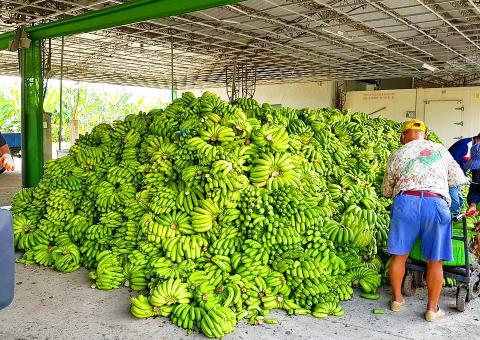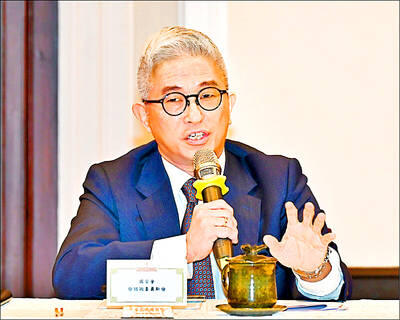Taiwanese researchers have developed a method using nanotechnology to extend the shelf life of bananas for 23 days.
The team was led by National Chung Hsing University professor Lin Yao-tung (林耀東).
Exhibiting the team’s techniques at a Ministry of Science and Technology pavilion at Computex Taipei on Wednesday last week, Lin said the technique is commercially feasible and more than 80 businesses, including household electric appliance suppliers, have approached the team seeking collaboration.

Photo: CNA
While plunging banana prices have grabbed media attention over the past few months, it is not a new problem, Lin said, adding that he has spent nine years researching techniques to extend the shelf life of various fruits.
Lin said he missed Taiwan’s various kind of high-quality bananas when studying in the US, adding that banana exports are unfortunately much weaker than local consumption.
Chilean agricultural products are exported an average distance of 11,157km and those of New Zealand an average of 10,765km, while Taiwanese agricultural products are exported an average of 1,793km, highlighting the nation’s need to develop more advanced techniques for keeping fruit fresh, he said.
Working with researchers in plant pathology, animal science and other domains, the team used mineral materials and agricultural waste to develop a coating for cardboard cases that slows down the ripening process by insulating the bananas during transportation, he said.
The results showed that the coating extended the shelf life of bananas, he said, adding that the technique could also be used in warehouse management systems.
The team also plans to collaborate with information engineers in developing an automated system for monitoring crops as they ripen, Lin said, adding that the system might soon be turned into a mobile app for farmers.
Asked about the cost of the technique, Lin said that academics spend less time thinking about business affairs.
The team might seek cooperations with companies that have expressed an interest in their technology, he added.
Lin teaches in the university’s Department of Soil and Environmental Sciences, where two graduate students, Tu Kai-fen (涂凱芬) and Yan Li-ting (嚴莉婷), have started an agricultural technology company named Agritech (艾格泰).

A car bomb killed a senior Russian general in southern Moscow yesterday morning, the latest high-profile army figure to be blown up in a blast that came just hours after Russian and Ukrainian delegates held separate talks in Miami on a plan to end the war. Kyiv has not commented on the incident, but Russian investigators said they were probing whether the blast was “linked” to “Ukrainian special forces.” The attack was similar to other assassinations of generals and pro-war figures that have either been claimed, or are widely believed to have been orchestrated, by Ukraine. Russian Lieutenant General Fanil Sarvarov, 56, head

SAFETY FIRST: Double the number of police were deployed at the Taipei Marathon, while other cities released plans to bolster public event safety Authorities across Taiwan have stepped up security measures ahead of Christmas and New Year events, following a knife and smoke bomb attack in Taipei on Friday that left four people dead and 11 injured. In a bid to prevent potential copycat incidents, police deployments have been expanded for large gatherings, transport hubs, and other crowded public spaces, according to official statements from police and city authorities. Taipei Mayor Chiang Wan-an (蔣萬安) said the city has “comprehensively raised security readiness” in crowded areas, increased police deployments with armed officers, and intensified patrols during weekends and nighttime hours. For large-scale events, security checkpoints and explosives

‘POLITICAL GAME’: DPP lawmakers said the motion would not meet the legislative threshold needed, and accused the KMT and the TPP of trivializing the Constitution The Legislative Yuan yesterday approved a motion to initiate impeachment proceedings against President William Lai (賴清德), saying he had undermined Taiwan’s constitutional order and democracy. The motion was approved 61-50 by lawmakers from the main opposition Chinese Nationalist Party (KMT) and the smaller Taiwan People’s Party (TPP), who together hold a legislative majority. Under the motion, a roll call vote for impeachment would be held on May 19 next year, after various hearings are held and Lai is given the chance to defend himself. The move came after Lai on Monday last week did not promulgate an amendment passed by the legislature that

PENTAGON ASSESSMENT: A US report said that even as China and Russia deepen their partnership, cooperation is hindered by a ‘mutual distrust’ of each other The Chinese People’s Liberation Army (PLA) as of October had doubled the number of ships and airplanes deployed around Taiwan compared with the previous two years, Vice Minister of National Defense Hsu Szu-chien (徐斯儉) said yesterday, a day after the opposition-controlled legislature voted against reviewing the government’s general budget for next year, including a NT$1.25 trillion (US$39.71 billion) special defense spending bill. The legislature’s vote against the Ministry of National Defense’s spending plans was regrettable, as the budget was designed to respond to the developing Chinese military threat, Hsu said on the sidelines of a legislative meeting on the general budget. Defense